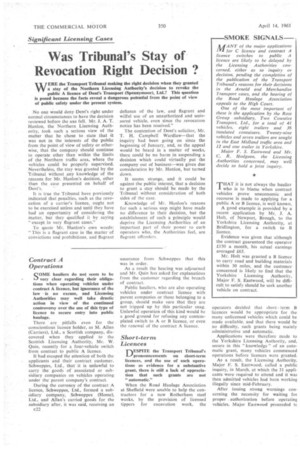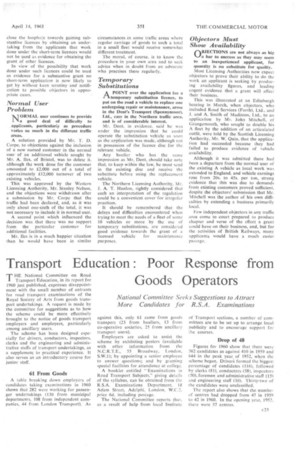Contract A • Operations
Page 62

Page 63

If you've noticed an error in this article please click here to report it so we can fix it.
QOME hauliers do not seem to be very clear regarding their obliga, tions when operating vehicles under contract A licence, but ignorance of the law is no excuse, and Licensing Authorities may well take drastic action in view " of the continued controversy over the use of this type of licence to secure entry into public haulage.
There are pitfalls even for the conscientious licence holder, as M. Allan (Carriers), Ltd., a Scottish company, discovered when they applied to the Scottish Licensing Authority, Mr. W. Quin, recently for a four-vehicle switch from contract to public A licence_
It had escaped the attention of both the applicants and their contract customer, Schweppes, Ltd., that it is unlawful to carry the goods of associated or subsidiary companies on vehicles operating under the parent company's contract.
During the currency of the contract A licence, Schweppes, Ltd., formed a sub;idiary company, Schweppes (Home), Ltd., and Allan's carried goods for the subsidiary after, it was said, receiving an c22 assurance from Schweppes that this was in order.
As a result the hearing was adjourned and Mr. Quin has asked for explanations from the customer regarding the breach of contract.
Public hauliers, who are also operating vehicles under contract licence with parent companies or those belonging to a group, should make sure that they are not tripped up by this particular snag. Unlawful operation of this kind would be a good ground for refusing any contemplated switch to A or B licence, or even the renewal of the contract A licence.
Short-term Licences
DESPITE the Transport Tribunal's pronouncements on short-term licences, and the use of such operations as evidence for a substantive grant, there is still a lack of appreciation that such grants are not " automatic."
When the Road Haulage Association at Sheffield were unable to help the contractors for a new Rotherham steel works, by the provision of licensed tippers for excavation work, the
operators decided that short term B licences would be appropriate for the many unlicensed vehicles which could be made available, and that there would be no difficulty, such grants being mainly administrative and automatic.
Applications were therefore made to the Yorkshire Licensing Authority, and, secure in this "knowledge" of an automatic grant, many vehicles commenced operations befbre licences were granted.
As a result, the Licensing Authority, Major F. S. Eastwood, called a public inquiry, in March, at which the 31 applicants were required to attend and it was then admitted vehicles had been working illegally since mid-February.
After issuing strong warnings concerning the necessity for waiting foi proper authorization before operating vehicles, Major Eastwood proceeded tc close the loopho!e towards gaining substantive licences by obtaining an undertaking from the applicants that work done under the short-term licences would not be used as evidence for obtaining the grant of other licences.
In view of the possibility that work done under such licences could be used as evidence for a substantive grant no short-term application is now likely to get by without keen scrutiny and notification to possible objectors in appropriate cases.
Normal User Problem
NORMAL user continues to provide a good deal of difficulty to applicants, particularly as procedure varies so much in the different traffic areas.
A solution provided by Mr. T. D. Corpe, to objections against the inclusion of a new named customer in the normal user of an additional vehicle sought by Mr. A. Iles, of Bristol, was to delete it, although the work done for the customer amounted to £2,000 out of a total of approximately £12,000 turnover of two existing vehicles.
This was approved by the Western Licensing Authority, Mr. Stanley Nelson, and the objections were withdrawn after a submission by Mr. Corpe that the traffic had been declared, and, as it was only about one-sixth of the total, it was not necessary to include it in normal user.
A second point which influenced the decision was that there was no support from the particular customer for additional facilities.
Mr. Iles is in a much happier situation than he would have been in similar circumstances in some traffic areas where regular carriage of goods to such a total in a small fleet would receive somewhat different treatment.
The moral, of course, is to know the procedure in your own area and to seek advice when in doubt from an advocate who practises there regularly.
Temporary Substitutions
APOINT over the application for a temporary substitution licence, to put on the road a vehicle to replace one undergoing repair or maintenance, arose in the Dent's Transport (Spennymoor), Ltd., case in the Northern traffic area, and is of considerable interest.
Mr. Dent, in evidence, said he was under the impression that he could operate the substitution vehicle as soon as the application was made, although not in possession of the licence disc for the relevant vehicle.
Any haulier who has the same impression as Mr. Dent, should take note that, to keep within the law, he must send in the existing disc and receive the substitute before using the replacement vehicle.
The Northern Licensing Authority, M r, J. A. T. Hanlon, rightly considered that such an interpretation of the regulation could be a convenient cover for irregular practices.
It should be remembered that the delays and difficulties encountered when trying to meet the needs of a fleet of some 10 vehicles or more by the use of temporary substitutions, are considered good evidence towards the grant of a licensed vehicle for maintenance purposes.
Objectors Must Show Availability
OIRJECTIONS are not always as big a bar to success as they may seem to an inexperienced applicant, for
quantity is no substitute for quality. Most Licensing Authorities now expect objectors to prove their ability to do the work an applicant is seeking by producing availability figures, and leading cogent evidence that a grant will affect their business.
This was illustrated at an Edinburgh hearing in March, when objectors. who included Road Services (Forth), Ltd., and J. and A. Smith of Madiston, Ltd., to an application by Mr. John Mitchell, of Grangemouth, who sought to double his A fleet by the addition of an articulated outfit, were told by the Scottish Licensing Authority, Mr. W. Quin, that the application had succeeded because they had failed to produce evidence of vehicle availability.
Although it was admitted there had been a departure from the normal user of the existing A vehicle as local work was extended to England, and vehicle earnings rose from 20s. to 45s. per ton, strong evidence that this was due to demands from existing customers proved sufficient, despite the objectors' submission that Mr. Mitchell was the author of his own difficulties by extending a business primarily local.
Few independent objectors in any traffic area come to court prepared to produce chapter and verse of the effect a grant could have on their business, and, but for the activities of British Railways, many applicants would have a much easier passage.
































































































































